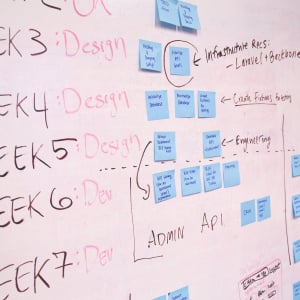Are you looking to expand into project management? Do you want to be a leader that people follow and who gets results? Here at STL Training, we provide you with the best project management tools to ensure you hit the ground running. In this post, we’ll expand on everything you need to be successful, from PM software and equipment to the methodologies and essential skills.
Carry on reading to learn more and use the following advice and tips to your advantage in your career.
The Key Skills
A good or bad project manager is often the difference between a project coming in on time or being late and over budget. The latter is a failure and can shatter a company’s reputation. So, it’s vital for businesses and prospective candidates to showcase the skills that ensure the project runs smoothly. They are:
- Leadership
- Communication
- Organisation
- Problem-Solving

Leadership
Being a manager means encouraging people to follow your example. Otherwise, you won’t be able to put your most crucial asset – labour – into effect. However, people don’t realise that being in charge also includes crafting a strategy and implementing a plan. PMs use their vision to put the project on a certain trajectory and get the best possible result at the close.
To execute your vision, leaders must make informed decisions on the spot, too. Therefore, the ability to read people and data and spot patterns and trends should never be underestimated. The final call is the project manager’s, so he or she should have no qualms putting their neck on the line.
Communication
Getting the point across clearly is half the battle. Project managers are able to condense complicated topics and make them readily understandable. Whether it’s feedback or useful data for the project itself, workers must know what it means and how to put it into action.
Face-to-face communication is as vital as ever due to the rise of technology. Instant messaging platforms are quick and reach a broad audience, yet the point can get lost in translation.
Organisation
The ability to organise isn’t solely a reference to multitasking. Multitasking is a handy project management tool, but it won’t be the difference between success and failure. Instead, that honour lies with prioritisation. To be certain processes run smoothly, the first port of call is to rank them in order of importance. Then, the common goals will fall into place.
Project managers understand that small tasks, although not massive, can sometimes be the most essential job.
Problem-Solving
A lot of the challenging work around project management is dealing with glitches. Often, issues will occur out of nowhere, and a problem must be solved as quickly as possible. Sometimes, the boss or the client might be the project’s biggest enemy in this regard as implementing new initiatives that weren’t discussed happens all the time.
PMs don’t complain – they find a solution. (also can consider attending project manager courses london)
Project Management Methodologies
A methodology is critical for completing the job correctly. There is a one-size-fits-all policy, but the following are useful in the majority of situations.
Agile
The Agile method focuses on developing software via a structure that centres around team collaboration and change recognition. It’s four central values make it a perfect methodology for flexible projects that are unpredictable. An example would be a service that hasn’t yet been built.
Scrum
Commitment, courage, focus, openness, and respect are Scrum’s values, and they help with complex products. The reason for this is that they use collaboration, accountability, and iterative progress to develop and sustain them. As well as team roles, it also includes events and artefacts so that small teams without many human resources aren’t disadvantaged.
Waterfall
In line with the name, Waterfall is a simplistic design approach where everything flows in one direction. Whereas newer methodologies are available, PMs love its linear phases that include analysis, coding and testing. Waterfall is excellent for big projects with lots of moving parts.
Project Management Software
The PM role is more complicated now than ever before, which explains the rise of project management tools and software. Completing a task without Trello, for instance, is difficult as the program offers reliable monitoring of all project phases. Slack is another significant tool as it puts colleagues in touch with each other so that delegation is feasible. MS Project is probably the main piece of software as it takes care of planning development, distributing resources, tracking progress and analysing work volumes.
The Need For Training
As you can see, there is a lot to factor in regarding project management software. So, let us help. STL Training is a trusted service that uses years of experience and expertise to make project management less daunting.
Contact us now to speak about our MS Project courses or Project Manager Training London.

